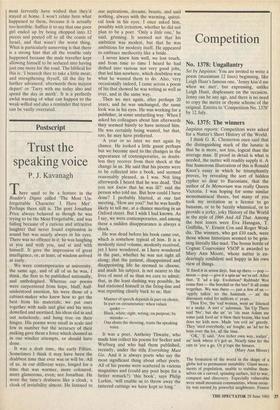Postscript
Trust the speaking voice
P. J. Kavanagh
There used to be a feature in the Reader's Digest called 'The Most Un- forgettable Character I Have Met'. Perhaps there still is. The poet Jonathan Price always behaved as though he was trying to be the Most Forgettable, and was failing because of a curious and attractive laughter that never found expression in sound but was nearly always in his eyes. There was no offence in it: he was laughing at you and with you, and at and with himself. It gave the impression of great intelligence, or, at least, of wisdom arrived at early.
We were contemporaries at university, the same age, and of all of us he was, I think, the first to be published nationally, and anthologised. Whereas our poems were carpentered from hope, bluff, half- understood emotion, his were those of a cabinet-maker who knew how to get the best from his materials; we put ours together with nails and glue and his were dowelled and mortised, his ideas slid in and out noiselessly, and hung true on their hinges. His poems were small in scale and few in number but the accuracy of their making gave them a force which shamed us in our windier attempts, or should have done.
It was a drab time, the early Fifties. Sometimes I think it may have been the drabbest time that ever was or will be. All of us, in our different ways, longed for a time that was warmer, more coloured, more glamorous, even; not Jonathan. He wore the time's drabness like a cloak, a cloak of invisibility almost. He listened to our aspirations, dreams, boasts, and said nothing, always with the warming, quizzi- cal look in his eyes. I once asked him, possibly with irritation, whether he did not plan to be a poet. 'Only a little one,' he said, grinning. It seemed not that his ambition was modest, but that he was ambitious for modesty itself. He appeared to embrace mediocrity like a bride.
I never knew him well, we lost touch, and from time to time I heard he had drifted into various not very good jobs, that led him nowhere, which doubtless was what he wanted them to do. Also, very occasionally indeed, I came across a poem of his that showed he was writing as well as ever, and in the same way.
Then we met again, after perhaps 20 years, and he was unchanged, the same look was in his eyes. He was working for a publisher, in some unstartling way. When I asked his colleagues about him afterwards they seemed barely to have noticed him. He was certainly being wasted, but that, too, he may have preferred.
A year or so later we met again by chance. He looked a little gaunt perhaps but we become used to the changes in the appearance of contemporaries, as doubt- less they recover from their shock at the change in us. He said that his poems were to be collected into a book, and seemed reasonably pleased, as I was. Not long afterwards I heard that he was dead. Did you not know that he was ill?' said the person who told me. But how could I have done? I probably blurted, at our last meeting, 'How are you?' but he was hardly likely to tell me, at a chance meeting in an Oxford street. But I wish I had known. As I say, we were contemporaries, and among these a sudden disappearance is always a shock.
He was dead before his book came out, which is somehow typical of him. It is a modestly sized volume, modestly received, yet I have wondered, as I have wondered in the past, whether he was not right all along; that the patient, disappointed and disappointing life he seemed to choose, and made his subject, is not nearer to the lives of most of us than we care to admit; that, in the least dashing way possible, he had stationed himself in the firing-line and was reporting clearly back to us; that Manner of speech depends in part on choice, In part on circumstance: when values quake —
Black, white; right, wrong; on purpose; by mistake — One shuns the shouting, trusts the speaking voice.
It was a poet, Anthony Thwaite, who made him collect his poems for Secker and Warburg and who had them published, recently, under the title Everything Must Go. And it is always poets who say the most significant thing about other poets. All of his poems were scattered in various magazines and (could any poet hope for a better remark?) 'this book', says Philip Larkin, 'will enable us to throw away the tattered cuttings we have kept so long.'


























































 Previous page
Previous page